The Soldier's Details

- Surname:
- Airey
- First Name:
- George Frederick
- Nick Name:
- Fred
- Rank:
- Warrant Officer Class 1
- Regimental #:
- WX13977
- Company:
- Battalion Headquarters
- Enlisted:
- 24.07.1939
- Discharged:
- 18.07.1950
- DOB:
- 17.10.1898
- Place of Birth:
- Kendal, Westmoreland, England
- Father's Name:
- James Airey
- Mothers's Name:
- Dora Alice Airey
- Religion:
- Church of England
- Pre-war Occupation:
- Packer
- Singapore:
- Taken on Strength with 2/3rd Machine Gun Battalion after escaping to Java
- Java:
- Bandeong, Bicycle Camp Batavia, Makasura
- Force:
- ‘ D ’ Force Thailand, Java Party No 6. O Battalion
- Camps Thailand:
- Hintok, Tarsau, Tamuang, Nacompaton
- Camps Java:
- Bandoeng, Bicycle Camp Batavia, Makasura
- POW#:
- 6506
- Return Details 1945:
- Bangkok-Rangoon by aircraft, Rangoon-Singapore, HMT Highland Brigade, Singapore-Fremantle, HMT Moreton Bay.
General Description
Warrant Officer Class 1, Frederick George Airey had soldiering in his blood. He served with the British Army during the Great War and when “Call to Arms” came for WWII, he was already serving with the Militia in Western Australia. Following the ‘Battle of Singapore’, Fred, along with 3 other men from 2/4th MG Battalion and 11 others were marched off to a remote location to be shot. Fred was one of the lucky ones to survive and managed to escape to Java by way of Sumatra. Fred then later passed himself off as an Australian Officer during his time as a POW so as not to draw attention to his past escape.
Fred Airey enlisted AIF 24 July 1939 and later joined 2/4th MGB’s Battalion HQ Warrant Officer Class 1 – Regimental Sergeant Major to 2/4th.
Christmas 1941 the Battalion was in Darwin, having departed Northam Jul 1941 and sent to SA to train, then onto Darwin – when given short notice they were being shipped out to an unknown destination (Singapore). Fred did not believe it was reasonable the men had all leave cancelled when they arrived Fremantle’s Gage Roads onboard ‘Aquitania’ from Sydney on 15 Jan 1942. When they tried to lower themselves down to supply vessels on ropes over the side, Fred did his best to enable many men depart the ship. Most of the men had been away from home as long as six months. Fred would have loved to have seen his family, but that was impossible and knew he had to set an example.
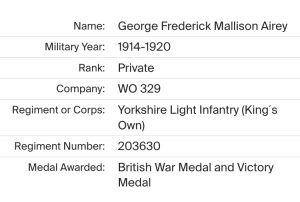
Fred served WW1 with 1/5th East Lancashire Regiment in France and at Chanak, Turkey with the British Army Occupation. He was recommended for an award for his actions on night of 18th-19th June 1917, and awarded the Military Medal.
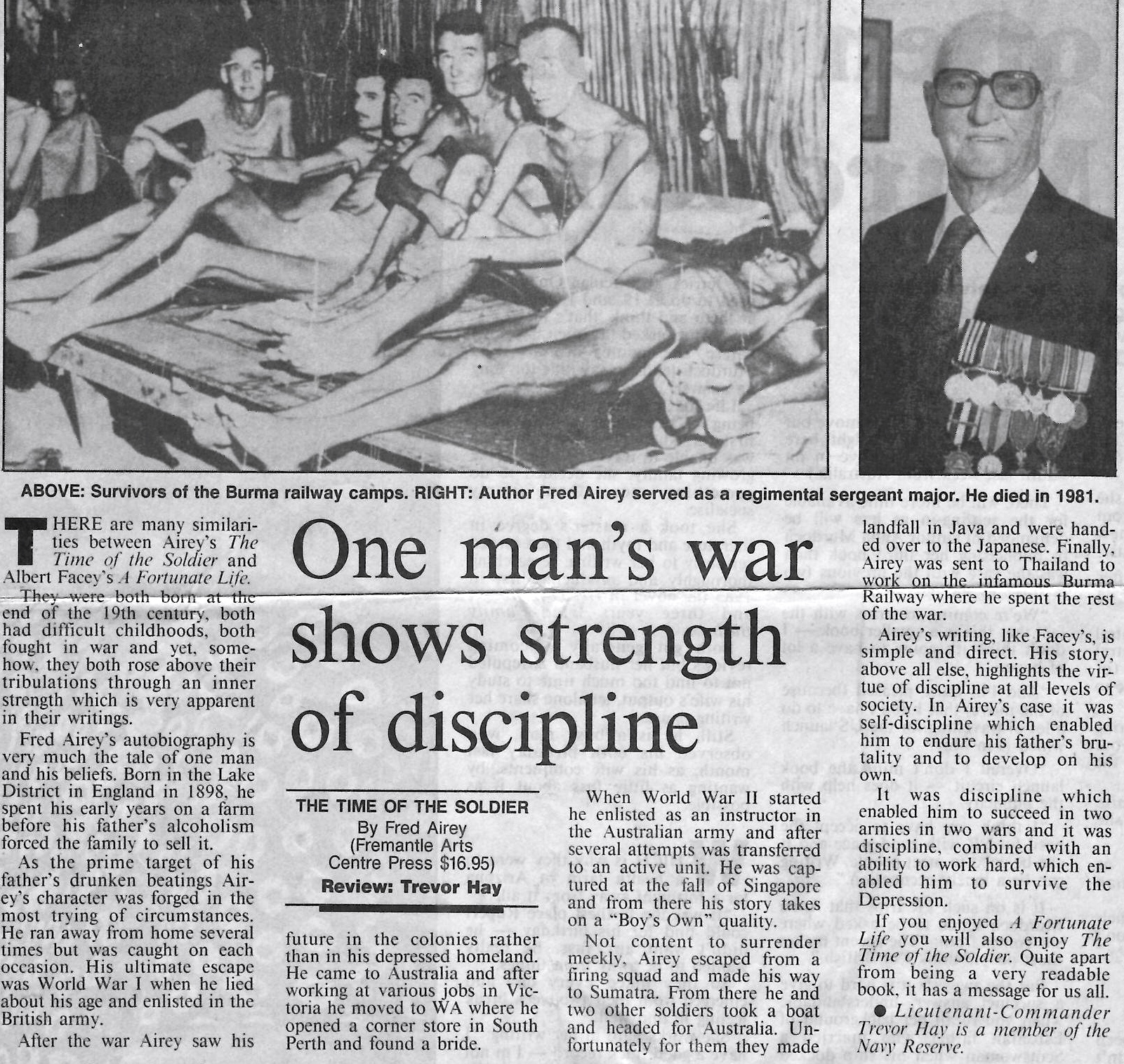
For further reading about Fred Airey Two came Home – The Firing Squad
The following has been copied from Airey’s statement for the United Nations War Crimes Commission
“I could not tell the men of the Japanese intentions. I next went out refusing to be tied, I was handled roughly being struck both before and after my hands were tied. I asked as best I could for an officer. The wounded men, McCann and Millhouse were not tied to the best of my belief. We were then told to march, proceeding under the eyes of about 1000 Japanese soldiers, up Reformatory Road. The men were quite unconcerned; in fact they thought it funny.
The Japanese in charge of the party appeared to me to be an officer or a warrant officer he was about 5 foot feet 6 inches tall, well built, about 24 years old. He was fair and good-looking for a Japanese.
Turning off the road into light growth we proceed south. Looking around I discovered that McCann and Millhouse were distressed. Breaking ranks I went back to McCann, who was being forced along with a bayonet in his rear. I sent McCann forward, the Japanese soldiers who had forced him along staying and threatening me. Millhouse was practically exhausted when he reached me having been forced to walk fast with a bullet wound to his knee, the Japanese bayonets drawing blood every time he slackened his pace. I went with Millhouse and we joined the party, taking up my former position.
Proceeding a further distance along the bank of a small stream we were told to form a single file. The Japanese in charge halted and pointed across the stream, calling an order the men immediately turned right to see how to cross the stream, when the first volley was fired. I saw two men falling forward into the stream, others crumpling up where they stood. A bullet whiz past my head (it had been impossible to form any plan to escape and up to this very second I had no idea that there was a chance in a million), I somersaulted into the bed of the stream and lay still. Millhouse couldn’t do anything and the Japanese in their usual cruel way left him to the last. In the meantime he told the Japanese in no uncertain terms just what he thought. I considered this extremely gallant.
After dropping everyone the Japanese proceed to make certain by giving us all an extra round. I heard the strike of the bullet into the body next to me and awaited mine. When it came the bullet grazed my forehead, taking skin only and covering my face with gravel, water and blood. I remained in this position until I heard the voices of the Japanese fading away. After sometime had elapsed I opened my eyes and cautiously looked around to make certain that the Japanese had gone. Sitting up I then cut my hands free with a razor blade which I had been able to extract from my haversack and then went around to possibly eight of the bodies that were screened from Japanese sight to ascertain if they were dead or had miraculously escaped as I had. They were all dead; the bodies that were lying above on the bank I called to them and getting no reply, I assumed that they were also dead also. I then attempted my escape.
Returning to Singapore from Java in 1943 I discovered that McCann was alive.”
Following Surrender to Japan, Fred along with three other men from 2/4th and 11 other Australian soldiers were marched off to a remote Singapore location to be shot by the Japanese. He and McCann miraculously survived the masaccre, although neither knew at the time. Fred escaped Singapore to Sumatra.
After escaping Singapore Airey managed a 5 day sail in a small boat to Sumatra. After Sumatra fell to Japan, he put to sea with others in a lifeboat which became wrecked, repaired and set off again for Australia.
With only 3 week’s rations and formidable currents after nine weeks they were no further than southern Java. In desperation and poor health they put ashore. Airey was taken POW and eventually sent to Bandeong.
Fred was one of 5 Australians who arrived Bandeong Camp, Java 8 July 1942 amongst a large group of POWs including 800 Dutch and other Allied POWs.
He was sent to the Burma-Thai Railway with Java Party 6 O Battalion.
He was recovered from Thailand at the end of the war from Nacompaton Hospital Camp.
Fred wrote a personal account of his early life and POW years in ‘The Time of The Soldier’.
As Regimental Sergeant Major of 2/4th MGB – Fred was proactive in tackling lack of discipline within the battalion, starting at Northam Army Camp. Having spent several years in the British Army WW1 he wrote about the lack of discipline starting with the officers – men who got leadership roles he believed because of family and social connections who were not suited to leadership. I believe Fred was absolutely correct in this assessment.
There appeared to be minimal leadership of POWs following surrender, and unfortunately within the work parties which left Singapore. At this time, leadership of POWs working in slave-like conditions, with little food, no medicines and so often, little hope, should have had leadership, but it was the doctors who took over these roles. There are several shameful incidents recorded. Fred acknowledged in his memoir, that he was fortunate being an officer, he did not actually work and hence his chance of survival was greater than the men. (Cheryl Mellor, Historian.)
Born 1898 Kendal, Westmoreland, England to parents James and Dora Alice Airey.
He served in WW1 before migrating to Australia.
Fred married about 1933 to Emily Gwendoline Bulloch known as Gwen. They had a family of three children, their first was their daughter born in 1934.
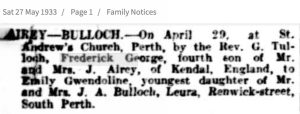
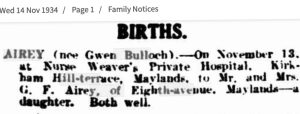
Below: Gwen’s father John Bulloch died in 1935.

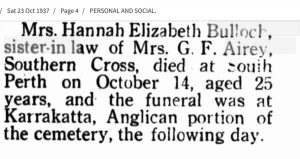
Above: The Airey’s are living at Southern Cross in 1937 when their sister-in-law Hannah Bullock aged 25 years died.
Returning from war Fred worked in real-estate.
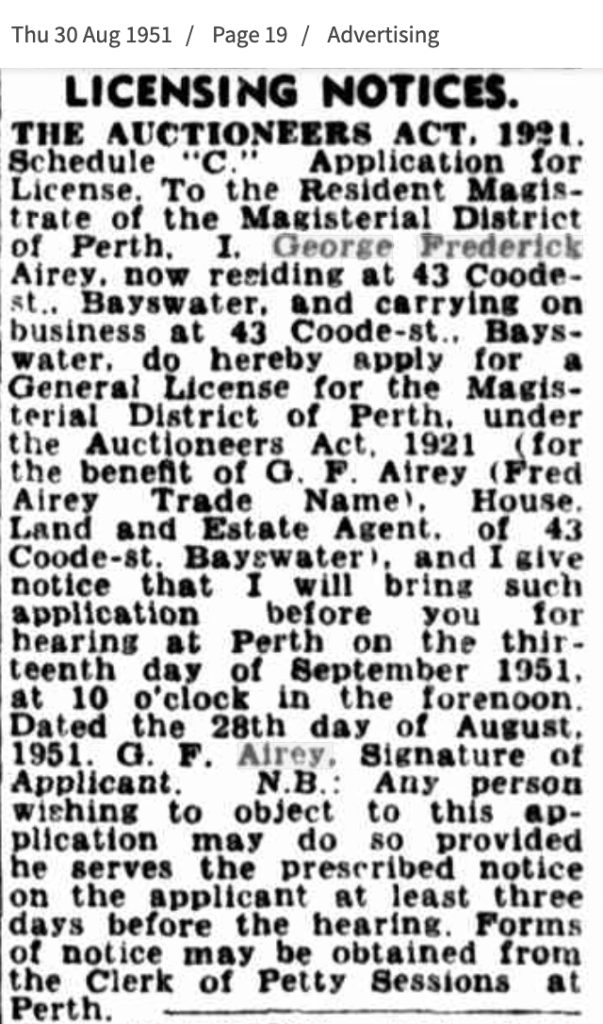
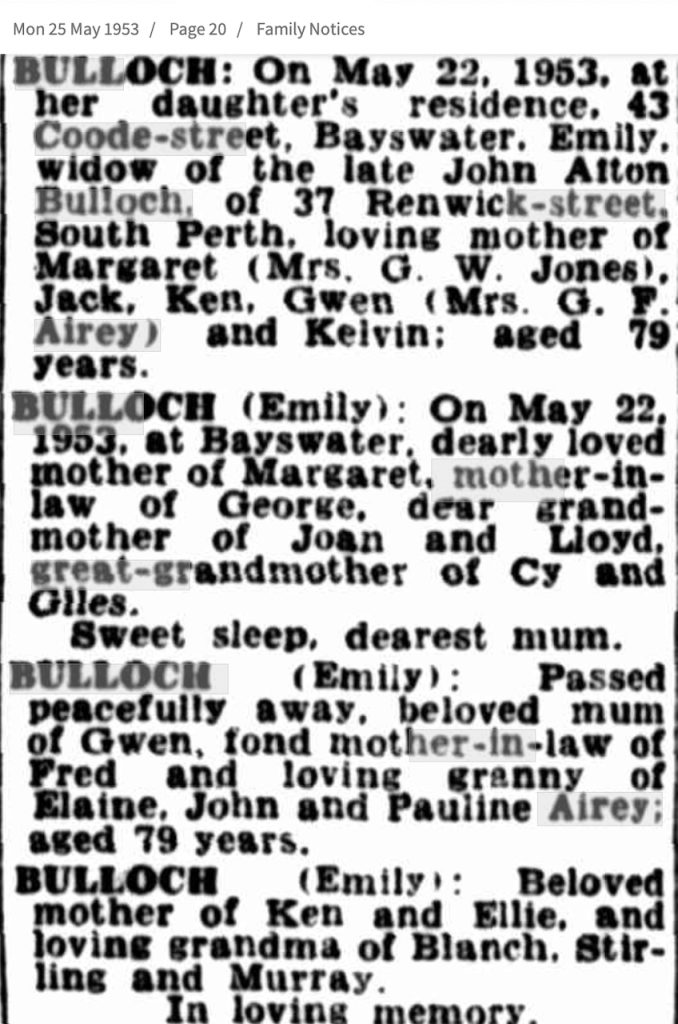
Above: Gwen Airey’s mother died in 1953.
Fred died 6 Sept 1981 aged 81 years. He was cremated at Karrakatta Cemetery.
Camp Locations:
- Hintok, 154k - Thailand
- Nacompaton, Nakom Pathom Hospital - Thailand
- Tamuang, Tha Muang 39k - Thailand
- Tarsau, Tha Sao 125k - Thailand
- Bandoeng - Java ***
- Bicycle Camp, Batavia, Jakarta - Java ***
- Makasura - Java





